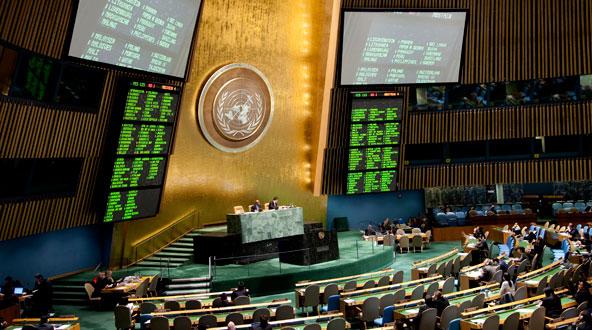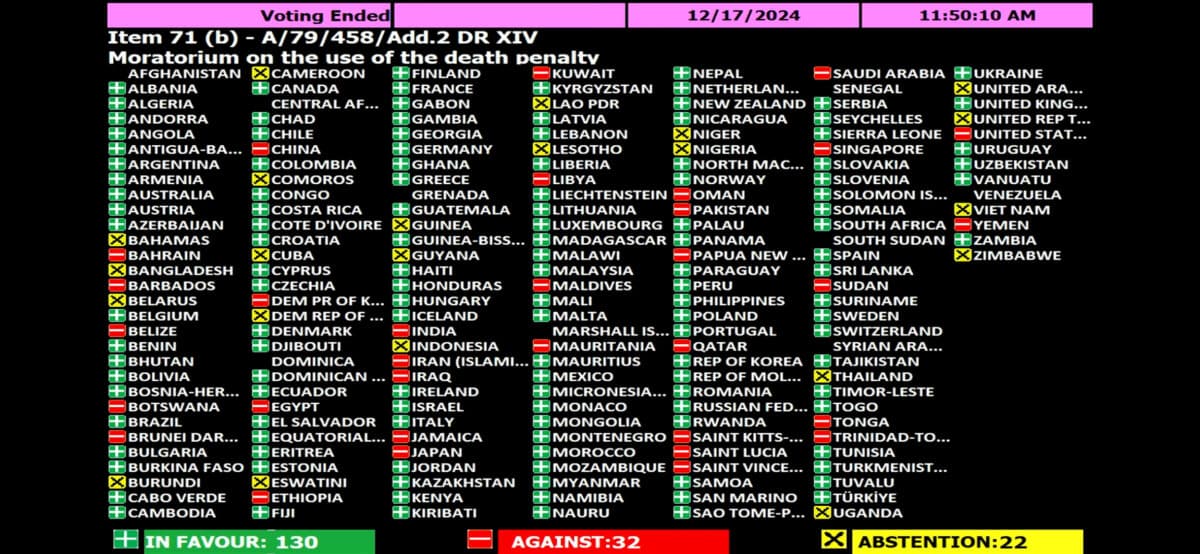
117 countries vote for a global moratorium on executions
International standards
On December 18, 2014, the UN General Assembly (UNGA) reaffirmed for the fifth time since 2007 its wide support for the resolution “Moratorium on the use of the death penalty”, showing that the trend towards abolition is irreversible.
Resolution A/RES/69/186, which already enjoyed increasing support during the vote of the UNGA’s Third Committee in November, was passed with a record 117 votes in favour, 38 against, 34 abstention and four absent.
The resolution has gained support over the years and is now cosponsored by 94 States. The cosponsors have decided to reiterate what they had stated in the past, but also to introduce new elements to make the text stronger in encouraging all States to take further steps towards respecting international law and reducing the application of the death penalty.
In particular, possibly as the result of the focus of World Day Against the Death Penalty 2014 on the death penalty and mental disorders, the paragraph of the text concerning vulnerable groups that was introduced in 2012 referring only to minors and pregnant women now mentions “persons with mental or intellectual disabilities” as well.
Consular protection for foreign nationals
Another important addition to the text is the paragraph concerning the protection of the rights of foreigners facing the death penalty, especially their right to receive consular assistance. Paragraph 5(b) calls on member states to respect their obligations under article 36 of the 1963 Vienna Convention on Consular Relations. The convention requires that states notify a detained foreign national of their right to inform their consulate or embassy of their detention so that they can receive assistance.
The World Coalition Against the Death Penalty welcomes the increasing support for the resolution (+6 States) and congratulates the 117 governments that voted in favour of it. The World Coalition regrets that 38 States (-3) voted against the resolution and that 34 abstained. Four were absent.
For the second time in a row, positive news came from Africa where Niger, Eritrea and Equatorial Guinea supported the resolution for the first time, while Uganda went from a negative vote to abstention, raising hope for abolitionists on the continent.
In the Arab World, Tunisia reaffirmed the positive vote already expressed in 2012 and Bahrain moved from a negative vote to abstention.
In Asia and the Pacific, Papua New Guinea, after a positive change in 2012, went back to opposing the resolution. Yet positive steps forward were taken by Fiji that voted in favour and Myanmar and Tonga that abstained.
In the Caribbean, Suriname supported the resolution for the first time, showing the will to move towards abolition already expressed during the World Coalition’s general assembly meeting in June this year.
The text of the new resolution requests the UN Secretary General to report to the General Assembly at its 71st session on the implementation of this fifth resolution. Another resolution on a moratorium will be then further discussed under the item “Promotion and protection of human rights: human rights questions, including alternative approaches for improving the effective enjoyment of human rights and fundamental freedoms” in 2016.
Photo: UN/Ryan Brown
Categories
Moratorium






